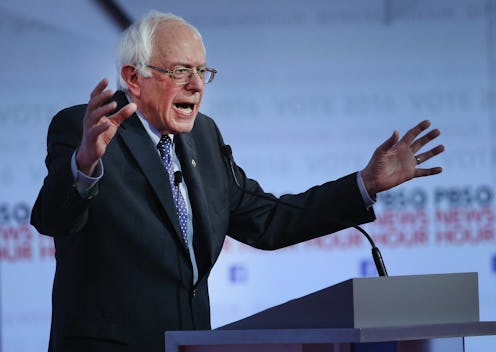News
Here's One Way Bernie Screwed Up
Well, that's another one down. Maybe you just watched the sixth Democratic presidential debate, or maybe you didn't. Maybe you're planning to catch up on it tomorrow. Or maybe you're not interested in seeing it at all! In any case, for the people who saw it and even those who didn't, the debate from Milwaukee, Wisconsin, left progressives with plenty to talk about. And here's a prime example: Perhaps the biggest one mistake Bernie Sanders made during the Democratic debate was coming up painfully short and noticeably awkwardly on the topics of racism and racial justice.
This isn't a new dilemma for Sanders, who's ridden his economic justice-centered platform to surprising and exciting success in the primary campaign so far. It's not even necessarily unique to his positions on race, either ― whenever a rival (at this point, really just Hillary Clinton) tries to pull him off-message and into a subject that isn't right in his wheelhouse, he tries to pivot straightaway back to income equality, Wall Street greed, and money in politics. It's arguably what has got him this far, so you can see why he's stuck to the plan.
But when this tendency manifests itself the way it did on Thursday night, especially on topics that matter crucially to so many of the black voters Sanders desperately needs to win to stand a long-term chance against Clinton, it's starts to look like quite the problem indeed.
Over the course of the PBS-hosted debate, Sanders made the following statements about race, racism, and how they'd be impacted by his winning the White House. Credit to the Washington Post's Team Fix for their transcript of the debate.
- Race relations would "absolutely" be better under a Sanders presidency than they have been under Obama, because "what we will do is say, instead of giving tax breaks to billionaires, we are going to create millions of jobs for low-income kids so they're not hanging out on street corners. We're going to make sure that those kids stay in school or are able to get a college education. And I think when you give low-income kids ― African-American, white, Latino kids ― the opportunities to get their lives together, they are not going to end up in jail. They're going to end up in the productive economy, which is where we want them."
- He admitted that black and Latino Americans face "other problems" in addition to low incomes and high unemployment ― the "other problems," it stands to reason, are the full weight of institutional, implicit, and overt racism ― but continued to frame it as primarily economic.
- He may not have meant to, and it could've been an innocent slip of the tongue, but he concluded by saying "yes, we can talk about it as a racial issue. But it is a general economic issue."
As journalist Dave Weigel noted on Twitter during the debate, this isn't exactly new territory for Sanders. The whole "race relations will improve because young minorities will have jobs" take is strikingly similar to what earned him a deluge of boos and criticism during his tumultuous appearance at the 2015 Netroots Nation conference. And the reason it irks some people in black activist and anti-racist circles is pretty straightforward ― the suggestion that race relations will improve from how they've been under the first black president, simply by virtue of increased employment and higher wages, is a clear suggestion that racism is a function of economics, not a distinct social and institutional crisis.
Frankly, as somebody hugely sympathetic to Sanders' platform, his story, and his intentions, it's pretty damn discouraging to see that we're back here again. Whatever complaints anyone might have with Hillary Clinton, she's been more on-point about this so far in the campaign, rhetorically at least. And while neither candidate has released as comprehensive, point-by-point, or realistically detailed a plan to combat racism (particularly in the criminal justice system and with regards to police use of force), it's fair for anyone who's passionate about this to wonder whether Sanders really gets it.
He's done some work to try to appeal to voters on these issues, sure ― his stated racial justice platform is undeniably more progressive than anything Clinton's put to paper just yet, even if it's light on the ever-crucial "how" part. But the simple question "do you understand that racism is distinct from economic toil?" is a worthy one, and if anti-racism and black life is your primary issue, it's fair to disqualify him if you don't feel good about the answer.
It's sort of like hearing a politician say they don't know why climate change is happening, but we should deal with it anyway. Simply put, if Sanders isn't firm on the first principles, can you really be sure he'll burn the political capital to get anything done on racial justice? And will he even have the right understanding and approach to meaningfully change things? It would've been nice to hear Sanders give a truly transformative statement that showed he's grown on this, but sadly, it came across more like a regression. And just weeks out from the South Carolina primary, it was really no time for that.
